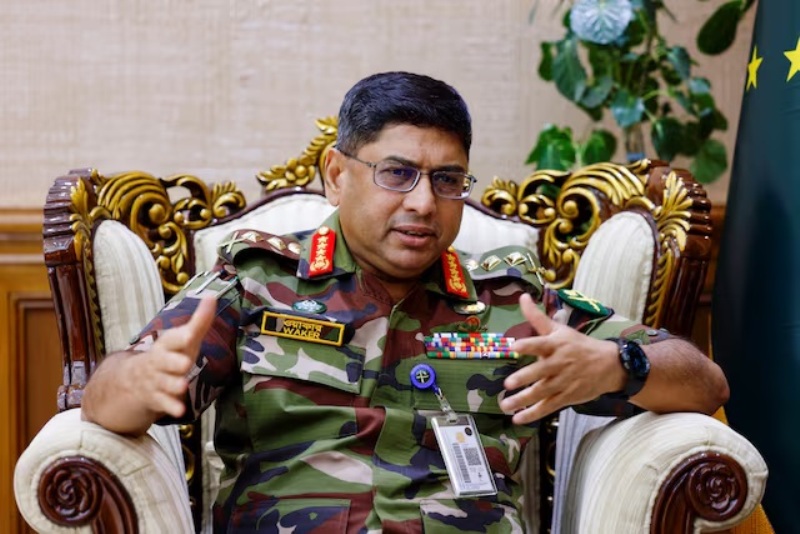Remaining firm on his stand that there will be no “humanitarian corridor” on the Bangladesh-Myanmar border, Bangladesh Army chief General Waker-uz-Zaman on Wednesday read the riot act to the Mohammad Yunus-led interim government, which had earlier proposed a passage for aid to reach Myanmar’s Rakhine State.
On his part, Khalilur Rahman, Bangladesh’s National Security Adviser (NSA), addressing a press conference in Dhaka, sought to give a spin to the issue of “humanitarian corridor”, saying that the government did not discuss anything on giving ‘corridor’ to Myanmar through Bangladesh with anyone and stressed that this will not even be discussed.
Rahman, who has changed his stance on the “humanitarian corridor” at least twice – once relating it to the repatriation of Rohingya refugees and then taking the plea of sending aid to the Rakhine State – said the interim regime was talking to the UN on channelling aid (food and medicines) due to the humanitarian crisis there.
Claiming that the interim government was not under pressure from any country, not even from the United States, Rahman said that any decision or consideration would be taken in consultation with all the stakeholders.
Addressing a darbar of all officers available in Dhaka, Gen Zaman made four critical points that reflected the Army’s uncompromising stand on the controversial issue of a “humanitarian corridor” that Bangladesh National Security Adviser Khalilur Rahman, a US citizen, had been insisting on since he took over the job on April 9.
First, Gen Zaman, using unusually strong language, shot down Khalilur Rahman’s proposal, saying there will be “no bloody corridor business”. Gen Zaman, who had previously indicated that the “humanitarian corridor” would have adverse implications for Bangladesh’s sovereignty, held the Yunus-led interim responsible for “keeping the armed forces in the dark while taking key decisions”.
Second, the Army chief, who was opposed within the larger force, especially by Principal Staff Officer in the Armed Forces Division, Lieutenant General Kamrul Hassan, made it abundantly clear that “elections must be held by December” and that only an “elected government” should determine the country’s course and not an administration that was not answerable to the people.
Third, Gen Zaman sent out a strong message that the “Army will no longer tolerate mob violence or lawlessness” prevailing across Bangladesh over the past several months. This lawlessness encouraged anti-social elements as well as supporters of certain political parties to resort to criminal intimidation and killings ever since the Yunus-led interim authority assumed power in August 2024.
At least one Commanding Officer, whose identity is not being disclosed, is said to have reacted to Gen Zaman’s speech, saying that “the 1971 liberation war legacy and national prestige (associated with it) were non-negotiable” and that it “cannot be compromised under any circumstances”.
The assembled officers, anywhere between 900 to 1,200 in number, conveyed to the Army chief that the “officer corps” stood united in support of Gen Zaman and was “ready to act upon command”.
ALSO READ: Why Bangladesh NSA Khalilur Rahman and Army chief Gen Waqer-uz-Zaman are not on same page
This indicated that while there was a vertical split in the top brass on the “humanitarian corridor” issue, a majority of the General Officers Commanding (GOCs) were solidly in support of the Army chief and his stand on why the interim regime should refrain from embroiling itself and the armed forces in the Rakhine State.















